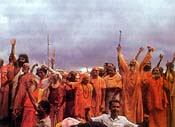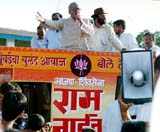Commentary/Mani Shankar Aiyar
Saffron Chic
It's good thing the Hindus don't bury their dead. For if the Father of Hindutva, Veer Savarkar, had been disposed of in a coffin, he would doubtless have been turning in his grave at the spectacle of what his most avid followers are now up to in the name of Hindutva. It was central to Savarkar's thesis that what distinguished the true Indian from the bogus one was that the true Indian worshipped his pitribhoomi (fatherland) and regarded only its sacred soil as his punyabhoomi (holy land).
 Since the Muslims looked west to Arabia, Turkey and Iran for religious inspiration and sanctuary, it followed, held Savarkar, that they could not be true Indians or true to the soil of India. Hindutva, that is, the nationhood of India, must, therefore, be entrusted to the Hindu whose pitribhoomi was this land and whose punyabhoomi lay not in some foreign part.
Since the Muslims looked west to Arabia, Turkey and Iran for religious inspiration and sanctuary, it followed, held Savarkar, that they could not be true Indians or true to the soil of India. Hindutva, that is, the nationhood of India, must, therefore, be entrusted to the Hindu whose pitribhoomi was this land and whose punyabhoomi lay not in some foreign part.
Fortunately for him, Savarkar shook off his mortal coils before the avid emigration of Hindus even farther west than the shores of the Red Sea began. Advani's problems with hawala operations are only a small segment of the overseas connections, enthusiasm, finance-- and even inspiration --- that accounts for much of the recent resurgence of Hindutva in our society and polity.
The Hindu of Hampstead Heath has emerged as the financial and intellectual standard-bearer of what once was called the 'Hindu, Hindi, Hindustani brigade'. The incense-filled corridors of 10, Ashoka Road are filled with Blimp-like ex-generals and former foreign service ambassadors.
It is curious, therefore, that the foremost Hampstead Hindu of them all, Swapan Dasgupta, should, with his exquisitely chiselled mastery of the mlechcha language, come down so heavily on the alienation from their indigenous roots of 'secular fundamentalists' (incidentally, a self-description he picked up from me at one of the unending round of seminars on the subject we are both compelled by our convictions to attend).
In the interests of the dialogue which he urges between communal fundamentalists, like himself, and secular fundamentalists, like me, I would commend to the secularists in my corner a perusal of the hugely amusing, punchy and pointed review that Swapan has done for Dileep Padgaonkar's Biblio (India's answer to The New York Review of Books) of Religion, Religiosity and Communalism put out by Praful Bidwai, Harbans Mukhia and Achin Vanaik. As I am yet to see the book, I shall have nothing to say on its contents; my concern is exclusively with the larger issues raised in Swapan's review.
These are easily summarised in Swapan's own words: 'What
is behind the secularist intellectual's deep contempt of indigenous traditions?' he asks. The answer quite simply is that the secularist intellectual has no contempt of indigenous traditions. He only thinks there exist, in addition to the indigenous traditions of Aryavarta genesis, a large number of non-Sanatani traditions, including, in particular, Muslim indigenous traditions. Why 'in particular'? Because the Hindutva mindset insists particularly on treating India's Muslim traditions as non-indigenous, whether of 'Hindu' origin or not, then why 'Hindutva' in preference to 'Bharatiyata' or plain and simple 'Indianness'?
 Next, asks, Swapan: 'Why are westernised Hindus so prone to self flagellation?' I am a westernised Hindu. So, incidentally, is Swapan Dasgupta. I have never flagellated myself on having been born into a Hindu home. My mother spent the last 20 years of her life in the Sivananda Ashram near Rishikesh. She never seemed to have any difficulty in reconciling her secular fundamentalism with her pious religiosity.
Next, asks, Swapan: 'Why are westernised Hindus so prone to self flagellation?' I am a westernised Hindu. So, incidentally, is Swapan Dasgupta. I have never flagellated myself on having been born into a Hindu home. My mother spent the last 20 years of her life in the Sivananda Ashram near Rishikesh. She never seemed to have any difficulty in reconciling her secular fundamentalism with her pious religiosity.
She certainly never imagined that
it was incumbent on her to go around Ayodhya chanting 'Ek
dhakka aur do' swathed in saffron scarves as at least one
editor of the Indian Express I know felt the need to do to reassure
himself that his fondness for Hampstead pubs is reconcilable with
his passion for Hindutva.
The only jam sessions I attended on Saturday evenings as a teenager
were bhajan mandalis. I enjoy a beer in a Hampstead pub quite
as much as Swapan, but my composite being has as much place for
bhajans as for beer. In much the same way, I am deeply convinced
that the composite traditions of India to which I am proudly heir
have place as much for the proto-Hindu and pre-Hindu traditions
of India as two thousand years of Christianity and a thousand
years of Islam have given us.
I believe it is the anti-thesis
of the Hindu tradition to reserve a distinct and, worse, superior
place for so-called 'Hindu' traditions over the other
traditions of India. I know my pious Hindu mother would have been
scandalised at the suggestion that any one Indian tradition was
more 'indigenous' than any other. She was, after all,
a good Hindu. Swapan Dasgupta -- and his ilk -- are political
Hindus.
|





 Since the Muslims looked west to Arabia, Turkey and Iran for religious inspiration and sanctuary, it followed, held Savarkar, that they could not be true Indians or true to the soil of India. Hindutva, that is, the nationhood of India, must, therefore, be entrusted to the Hindu whose pitribhoomi was this land and whose punyabhoomi lay not in some foreign part.
Since the Muslims looked west to Arabia, Turkey and Iran for religious inspiration and sanctuary, it followed, held Savarkar, that they could not be true Indians or true to the soil of India. Hindutva, that is, the nationhood of India, must, therefore, be entrusted to the Hindu whose pitribhoomi was this land and whose punyabhoomi lay not in some foreign part.
 Next, asks, Swapan: 'Why are westernised Hindus so prone to self flagellation?' I am a westernised Hindu. So, incidentally, is Swapan Dasgupta. I have never flagellated myself on having been born into a Hindu home. My mother spent the last 20 years of her life in the Sivananda Ashram near Rishikesh. She never seemed to have any difficulty in reconciling her secular fundamentalism with her pious religiosity.
Next, asks, Swapan: 'Why are westernised Hindus so prone to self flagellation?' I am a westernised Hindu. So, incidentally, is Swapan Dasgupta. I have never flagellated myself on having been born into a Hindu home. My mother spent the last 20 years of her life in the Sivananda Ashram near Rishikesh. She never seemed to have any difficulty in reconciling her secular fundamentalism with her pious religiosity.